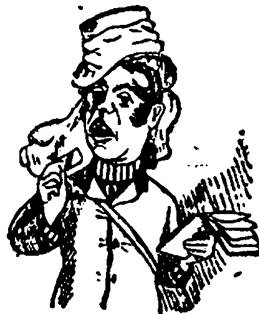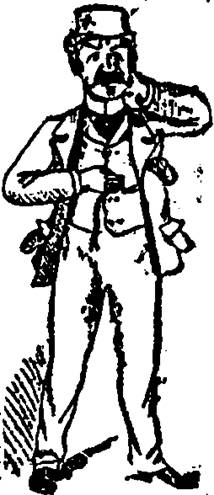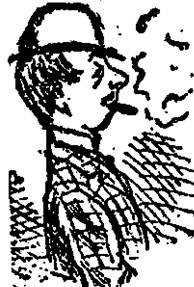This article has been transcribed from a copy of the Cardiff Times in the online collection of scanned Welsh newspapers 1804-1919 in the National Library of Wales, with grateful recognition of the free access accorded to all readers. Where necessary paragraph breaks have been introduced for easier reading.
Until 1960, when off-course betting was legalised in Britain, bets would be taken illegally in a pub by a bookie’s runner, who would run them to a legal bookmaker, while keeping an eye open for the law. (The wealthy of course, had legal ways of laying bets.) This article mentions some of the most prominent, indeed addicted major players in the racing world. Samuel’s ‘unprofessional betting men’ on the other hand are very small fry. Some are on the look-out for ‘flats’ or naïve dupes, while others are their victims. — David Skilton
I am not at the outset, sir, going to enter into any moral dissertation upon the subject of betting on horse races, for to tell you the plain truth, I haven't thought anything about the matter, and I don't intend to. I merely wish to speak of a few persons I have known who indulge in the practice commonly known as ‘putting a little bit on.’ Let me plunge in medias res at once, sir, and say that the commonest and broadest characteristic of the unprofessional better is that he always tells you, with much elation, what he has won, but never reveals what he has lost, unless he happens to owe you a trifle, when you find, from his own melancholy statement, that he has plunged heavily, has gone a ‘buster,’ has staked his all -- fifteen shillings perhaps — upon the hazard of a race. The next characteristic is that he knows such a preternatural amount, according to his own account, about betting and the horses that are to run, and, despite that fact, is always inquiring of all the males he meets whether they know of ‘a good thing.’

Anybody name the card?
Naturally, he in the course of a day gets a good many ‘good things’ all for the same race, and then he falls back upon his own marvellous judgment, or consults the enigmatical prognostications of newspaper correspondents in the racing line. One of these will, with charming perspicacity, opine that ‘Roarer should be a good thing, though many knowing ones prefer Bustup, which may not run, and Cutoff, which, despite its unbroken record, is said by some to be in good condition and by some to be in bad form.’ Then the said ‘tip’ will go to say that ‘Roarer, in addition to this, will have to meet such splendid horses as Gingerpop, Hokey-Pokey, Ipecacuanha, Giuseppe Giorgione, and Assafœtida, all of which are likely to win, especially the last five of them.’ This is very cheering and direct intelligence, and the unprofessional better makes his ‘book; accordingly, and seeks a leery-looking man with a check suit, who stands somewhere near a public-house all the day long; and who, in the off season, often amuses himself by riding with a confederate on some line of railway, picking up flats with the three-card trick. To this worthy he hands a couple of shillings, and then feels that he is indeed a racing man, and a fitting companion for your Hartington, your Hammond, and your Rosebery.

‘Won a bit, Sir!‘
When I said that he made a book, I perhaps indulged in pardonable exaggeration. He makes a few notes on the back of an envelope or a summons for the water rate, and demonstrates to you by the most abstruse methods of calculation that he stands to win some such considerable sum as seven-and-six- pence, and that he has been so astonishingly artful in his reckoning of the chances that he cannot possibly lose more than an indefinite amount which he calls a ‘trifle.’ He is generally consumed by a wild desire to tell his friends this, and usually begins by asking the latter if they have got ‘anything on.’ When they in return ask him the same question, he suddenly becomes mysterious, yet cheerful, and says ‘A bit,’ which of course leads them to suppose that he is in for a very good thing. Above all he longs to be thought knowing, subtle, and artful; he is consumed by a desire that his friends shall go away saying to each other that he is a ‘sly old fox,’ and that he generally has ‘a bit up his sleeve,’ whatever that may mean. He, in great confidence, confidently assures you of the great things he could do on the turf if he only had the wherewithal to ‘plunge a bit.’ The word ‘bit,’ you will perceive, occurs most frequently in his vocabulary, possibly because ‘bits’ are positively essential to the management of horses.

‘Two to One, Bar One’
As any given race-day approaches there is a marked restlessness about him. As soon as noon arrives he seeks some hostelry near one of the newspaper offices; that is, if he can by any possibility escape from his usual employment, and he waits eagerly for the declaration of the result. Sometimes, if the race ground is within easy distance, and there is a cheap trip running, he seeks the scene of action itself, and tells you that he prefers betting when he can see the horses and their ‘form’ for himself, and call into action his own indisputable judgment. At the race-ground itself he will often pay for entrance to the enclosure and grand stand a sum far exceeding the total amount of his book. but you see he has the inestimable privilege of being on nodding terms with several professional bookmakers, and this, most naturally, gratifies [img4]his vanity. Very often his visits are disastrous. He either loses his money, or his watch, or his railway ticket, or all three — and his temper in addition -- and in such a case as this he sometimes goes so far as to tell you that betting is, after all, a ‘mug’s game,’ though what that may be you have very little idea till it is explained to you. It is delightful to witness his confident air when he wins, though. He doesn't tell you precisely how much he has gained, but be puts his hand into one of his pockets, smiles meaningly, and rattles his coin about, as much as to say, ‘I've done enormous business but I'll be modest, and not make your mouth water.’ If you happen to observe that you wish you had been in the boat, he will turn suddenly grave and tell you that betting requires a lot of ‘watching,’ and a special aptitude, and in doing this he will imply that you yourself do not possess the necessary order of intellect.

‘By Jove; My Watch is a Le(a)ver This Time!‘
One thing you may always be certain of, my dear sir, and that is that the amateur racing man will certainly tell you, in the most respectful strain, how substantial would have been his gains if such and such a horse had only come in first, as it ought to have done to oblige him. As a rule he has built upon such a contingency, and made up his mind beforehand what he will buy for his wife when the event comes off. As it is, the good lady in question finds herself, at the end of the week, with less housekeeping money than she expected, and there is unpleasantness in the family circle. The non-professional better has frequently a weakness in the way of getting up sweepstakes amongst his own friends, though why he indulges in such fatuity I know not, sir, for I have always found that the man who gets up a sweepstake, and takes no end of trouble in doing so, draws an outsider, unless he be very artful indeed, and arranges the drawing beforehand by some ingenious device. As a rule, however, he draws a lamentable outsider, and has to undergo the melancholy ordeal of witnessing the chuckle-headed youth, who draws the favourite, and who, as a consequence, when the event is over and the favourite wins, seeks festive scenes, drinks too much, and loses his employment. It is seldom, sir, that the amateur racing man bets continuously through the season; sometimes, indeed, he never gets beyond the Lincolnshire Handicap; then seeks discreet retirement. Were you to ask him if he had ‘anything on’ under such circumstances, he would say in an off-hand way, ‘No; I’ve given up that sort of thing, you know; too busy nowadays; had lots of good things given, but didn’t bother.’ In saying this he of course conveys the idea that if he had only chosen to exert himself he might have been worth a small mint of money.

‘A Clean Sweep’
One thing you can make your mind up about, and that is that the amateur better finds the names or the various [img4] horses a perpetual bête noir[e] to him. He mourns and deprecates the eccentricity of the favourite’s name perpetually, and has to adopt different pronunciations, according to the class of company he is addressing. The horses which run in the Grand Prix de Paris in particular bother him, and he lets you, when you are conversing with him, name them ere he ventures upon a pronunciation of his own. Sir, I do not know of a bigger humbug than the non-professional betting man – except his professional brother. Were you to go and ask an official trustee he would tell you that your hopeless bankrupt, who cannot account for the whole of the moneys received by him, frequently to make up the deficiency puts down ‘Lost on the turf, £200,’ on the same principle that house-keepers have such a way of filling in blanks by putting a goodly amount opposite the vague entry known as ‘Sundries,’ and the turf partly gets the credit of bringing about the bankrupt's ruin, though nobody ever recollects making a bet of more than a florin with him. The unprofessional betting man, sir, has all the slang and the effrontery of the real article without the boldness, the courage, the business-like aptitu[de,] the cunning and the reserve of the latter, and I again emphatically repeat that he is a miserable transparent, unmitigated humbug, and a fraud, a delusion, and a snare.
Last modified 1 December 2021